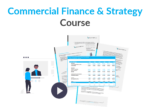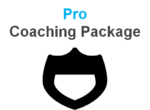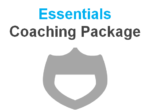
5 Steps To Ensure Recruiters Take You Seriously
Whilst we don’t recommend using a recruiter to land your next role for a whole variety of reasons, you may find yourself taking a few in-bound recruiter calls and even see a few roles listed on a recruitment agency website that take your fancy, when considering your post-accounting & audit exit options.
Let’s say you do engage with recruiters. If you’re seeking more strategic & commercial roles, it’s likely that you’ll have experienced some of the following:
- Continuously being sent the same types of roles over and over again, despite you specifically saying you’re looking for something different (in the worst case, they may send you the exact same role multiples times or even tweak the job title to sound more strategic-focused!)
- Being told that your technical Accounting background limits you to technical & reporting roles at this stage in your career
- Being told that the “only way” to get your preferred job is to spend multiple years doing XYZ first
Due to the way recruiters are incentivised, it’s YOUR job to ensure they don’t place you squarely in the “Accountant” box. It’s very easy for them to recruit an existing Accountant into another Accounting role.
In order to make recruiters feel comfortable recommending you for more strategic & commercial roles, you’ll need to prove that your core skill set goes well beyond technical accounting, finance and Excel spreadsheets.
Here are a few tips on how to ensure recruiters take you seriously.
1) Meet them in person.
We’ve all heard of the stereotype of Accountants being socially inept. Of course, we all disagree, but you may find yourself needing to prove this to other people!
Showing up in person to meet a recruiter is your opportunity to showcase your inter-personal skills.
You’ll also be able to build a rapport with them over an informal coffee (for one thing, they’ll appreciate the excuse to have a break from the office & their endless prospecting calls)
It also serves as a practice interview with future employers. The more practice you have in perfecting your elevator pitch, the smoother it will become. You’ll be able to uncover any concerns or qualms recruiters might have with your background / experience, and ensure you can counteract them in your next conversation and elsewhere along your job search route.
Remember: Your initial call or meeting with a recruiter may feel quite informal, but rest assured, you’re being judged the whole time.
2) Expand and refocus your CV/Resume
Given the amount of time you’ve dedicated to Accounting & Audit to date, it can be tempting to list all of the technical facets of the projects you’ve worked on to show how you’re King or Queen of all Accountants.
But remember: so far, you’ve been competing solely in the Accounting & Audit arena. You’re about to branch out and meet competition from other walks of life and you’re CV/Resume needs to reflect that.
We’re not trying to encourage you to be something you’re not. As a young newly-qualified Accountant, you won’t be able to compete against a Marketing guru or Deep Tech genius. Nor do you need to.
Rather, you need to appreciate that you’re being sold as a newly-qualified Accountant, so employers will expect you to understand the usual Accounting technicalities (think: SOX, IFRS, GAAP, etc.). Why not save the space on your CV/Resume?
Your precious CV/Resume real estate should instead be used to emphasise your strategic & commercial mindset and / or your niche blend of Accounting + [ANOTHER IN-DEMAND SKILL GOES HERE].
Trust me.
No one outside of the world of Accounting gives a flying f*%! about Sarbanes Oxley or IFRS 9 (sorry!).
Instead, you need to sharpen your commercial acumen and build out key strategic thinking capabilities. It’s why we built our Commercial Finance & Strategy – Principles and Execution online course specifically for accountants & auditors.
Side note: Check out “Spice up your CV/Resume | A Guide for Accountants & Auditors“.
3) Don’t tell them your salary!!
If you’re part of a grad scheme at any of the main Accounting firms, chances are you’ll be on exactly the same salary as your peers.
In recruiting season, recruiters will probably be speaking to each and every one of the other grads in your intake, and you can guarantee that the majority have given away what their salary is.
So guess what?
Recruiters (and thus your potential employer who will be negotiating against with you for your salary & benefits package) can make pretty accurate assumptions about the minimum salary that you would be happy to receive, regardless of the role (and salary) you are going for.
Quite frankly, recruiters are rude to ask about your benefits package, but it’s worth a try in the hope that you give them a golden nugget of information. They may even use such information to increase the margin they make when placing you in a job (and thus their own commission / bonus).
If asked, ignore the question and simply say something along the lines of “I’m happy accepting the market rate for this role.”
If pressed again, repeat yourself.
If pressed again, repeat yourself. They’ll understand. In fact, they will hear this from the majority of their senior-level candidates.
Ultimately, your compensation & benefits should be based entirely upon what the role in question is worth in the market, and not based at all on what you are paid today.
By holding back such sensitive information, recruiters will be less inclined to associate you with other young trainee-accountant candidates with zero negotiating expertise (this is often a responsibility reserved for much more senior positions).
Instead, you’ll increase your bargaining power and chances of drastically increasing your salary as now said recruiter can’t be certain that you didn’t haggle for a better package vs. your peers given your ninja negotiating skills 😉
4) Ask questions
This may seem a fairly obvious point, but when interacting with recruiters, it should be a two-way conversation.
As much as potential employers want to find out about whether you are a good fit for their open roles, it is equally as imperative that you find out if they are a good fit for your career goals.
In-demand employees can afford to be fussy with the roles they spend their time interviewing for. So asking lots of questions will help ensure you don’t come across desperate.
You should be trying to find out more about the roles and employers you could be working for PRIOR to spending your precious time on the interview & application process.
And asking the right questions is a learned skill.
You may have noticed that when senior people speak, their ratio of questions-to-statements will be quite high (unless you’re Trump). Generally, Senior Executives know they don’t have all of the answers, but they’ll be asking the right questions to gain a good enough understanding; and fast.
Asking questions gives you the ability to scope out a new landscape swiftly, arrive at answers as quickly as possible, and gives off an aura of seniority / leadership.
5) Make their life easy
Recruiters don’t have time to remember everything from the hundreds of sales calls they have per day.
Given the restraints on their time, they are more likely to recommend you if it’s quick and easy to do so.
Why not send them a (short) update note/email or highlight the key points you’d like them to communicate to the employer (i.e. emphasizing your relevant experience for the role in question, not just the things you were good at in your previous role).
Got a recruiter conversation coming up and worried about what to say? Perhaps your having trouble getting past the first conversation? Get advice from one of our Co-Founders, who are happy to help craft your game plan.
Exit Options | Mapping the post-accounting & audit landscape
A lot of the clients we coach ask about moving into more strategic & commercial roles after spending time in traditional accounting & audit, but don’t know where to start or even what opportunities exist …so-much-so that we’ve put together a map of the landscape of accounting exit opportunities, which I encourage you to check out!
Want to land (and master) more strategic and commercial roles?
Learn how to upskill beyond your technical accounting & audit background in the first (and only) online course built specifically for accountants. Through interactive modules, case studies, and real-world applications, you’ll learn how to confidently build financial models, assess business opportunities, and everything else needed to contribute meaningfully to strategic decision-making. Build hard commercial skills to future-proof your skill set and prove you can translate your accounting background into a commercial context with the Commercial Finance & Strategy – Principles and Execution online course.
Spice up your CV/Resume for the post-accounting & audit world
We’ve created a digital guide specifically to help those of you applying for more commercial & strategic roles. Our straight-talking CV/Resume advice for Accountants/Auditors is the only guide that is highly-specific to the traditional accounting & audit background: we give you real-life good & bad examples for showcasing your experience for strategic roles, the best structure & content to win over recruiters, a strategy for distributing your CV/Resume, interview advice, and more!
Want personalised advice from one of our Co-Founders?
We’ve been where you are and can help you forge your swift exit. Click here to Get Coached.











